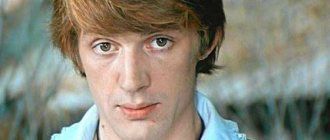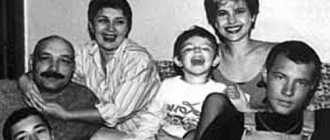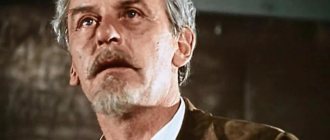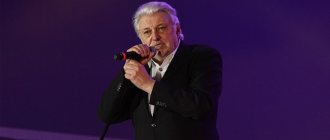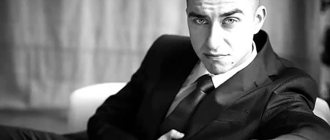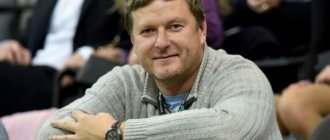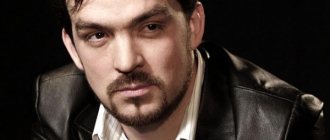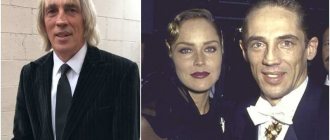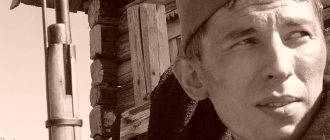Vsevolod Abdulov: biography
Vsevolod Abdulov, an actor of Soviet cinema, the closest friend of Vladimir Vysotsky, was born into a theatrical family in 1942.
His father, People's Artist Osip Abdulov, was an outstanding actor of the Moscow Art Theater. The artist’s mother, Elizaveta Metelskaya, was also an actress. Subsequently, she began writing plays for the children's theater stage, as well as scripts for radio plays. The boy was born in evacuation in Chisinau, where the theater staff was sent after the start of the war. Video course “Spring”
Landscaping for busy people, a beautiful garden without the hassle
A training course for those who want to make their dacha beautiful and prefer to spend their time, effort and money wisely.
Special offer! 50% discount! Make good use of your self-isolation!
₽ 1200.00 ₽ 600.00
MORE ❯❯❯
Vsevolod Abdulov in his youth | Cinema
His father passed away when Vsevolod was barely eleven years old, but the boy already then became involved in the backstage of the Moscow Art Theater, and later studied at the Studio School. His admission cannot be called impeccable, since he was not accepted into the coveted university, and Seva did not want to study at GITIS or the Shchukin School. And he made a second attempt. During the repeated assault by the admissions committee, the young applicant was noticed by a graduate of the institute, Vladimir Vysotsky, who, despite being busy with state exams, helped the young man to enroll.
Biography[ | ]
Born on December 29, 1942 in Moscow in the family of actors Osip Naumovich Abdulov and Elizaveta Moiseevna Metelskaya (née Shekhtman). His famous father, a colleague of Zavadsky, Ranevskaya, Plyatt, and Maretskaya, instilled a love for theater in his son.
In 1960, he applied to all theater universities in Moscow[2]. He has already been accepted through competition into GITIS and the Theater School named after. B. Shchukina. But he couldn’t get into the Moscow Art Theater School (where he wanted most of all). At one of the consultations, he met Vladimir Vysotsky - he, already an undergraduate student, noticed the young applicant and taught him something. This helped him, and he was enrolled in the Moscow Art Theater School.
After graduation, he played at the Moscow Taganka Theater, on the stage of the Moscow Art Theater. Here the young actor was lucky enough to go on stage with the famous Moscow Art Theater “old men” - Androvskaya, Yanshin, Gribov, Prudkin. He also masterfully read Pasternak, Akhmatova, and Tsvetaeva. His recordings are kept in the collections of Russian radio. Discs containing recordings of radio plays with his participation and poems by various poets performed by him were released on the All-Union. One of the most famous discs is a double record with a recording of Lewis Carroll's fairy tale "Alice in Wonderland", where he performed several roles and songs written specifically for this dramatization by Vladimir Vysotsky.
Before O. Efremov came to the Moscow Art Academic Theater as chief director, he was in the public eye, but then went into the shadows. After the division of the theater, he ended up at the Moscow Art Theater. M. Gorky, but I couldn’t work there either: the relationships in the team were too complicated.
As a film actor, he was known primarily for the serial television film directed by Stanislav Govorukhin “The meeting place cannot be changed.”
In recent years, he has voiced foreign films and cartoons. He is also known for his performance as Pontius Pilate in the Russian version of Andrew Lloyd Webber's rock opera Jesus Christ Superstar.
In the fall of 1977, when the actor was returning from filming in Baku, near the city of Efremov, the front wheel exploded under the car, and the car overturned six times. As a result, the actor was hospitalized with severe injuries and a concussion. For twenty-one days he did not regain consciousness. Then there was an improvement, although the doctors said that he was “unpromising.” Only by spring did he begin to recover.
His close friend, Vladimir Vysotsky, mentions this incident (using a play on words) in his poetic dedication “ To Oleg Efremov on his 50th birthday
":
" Here the director in the actor dies, But here's a paradox and an inflection: Abdulov Seva - Everyone knows Seva -
Almost died
in Efremov ."
However, the accident greatly affected the actor’s life. He could no longer play in the theater with the same intensity.
Last years of life[ | ]
In the last years of his life, the actor’s memory became very bad. Abdulov refused to act and devoted himself almost entirely to radio and dubbing, often staying in hospitals. In 2002, he fell into a state of oblivion and was hospitalized in one of the hospitals.
He died at the age of 60 on the evening of July 27, 2002 in a Moscow hospital. He was buried in the 8th section of the Vvedensky cemetery, next to his father[3]. On the day of the actor’s death, his great-grandson Vladimir Harutyunyan was born.
Friendship for life
From that moment on, the young actors became great friends. They spend all their time together, in noisy companies. During parties, Vladimir writes poems and songs, which will later become part of the Soviet bard's treasure chest. Before Seva’s eyes, Volodya and Marina Vladi met, which ended in a stormy lifelong romance. Thanks to the efforts of Vsevolod Abdulov, the singer was able to be kept for many years before the abyss of alcoholism.
Vsevolod Abdulov, Vladimir Vysotsky and Marina Vladi | MoscowCity
After the death of Vladimir Vysotsky, his friend withdrew into himself for a long time. He never discussed the facts of the poet’s personal life with anyone. Later, he nevertheless left his memories in the form of an interview with Vysotsky’s son, Nikita, who, based on them, created a biographical film about his father. In the film, the charming Vsevolod was played by the well-known Ivan Urgant. Vsevolod spent all the anniversaries of the death of Vladimir Vysotsky at the grave of his friend, each time greatly mourning the loss.
[edit] Biography
Vsevolod Abdulov was born on December 29, 1942 in Moscow in the family of People's Artist of the RSFSR Osip Naumovich Abdulov and Elizaveta Moiseevna Metelskaya (Shekhtman).
Vsevolod’s love for the theater was instilled in him by his father, a colleague of Zavadsky, Ranevskaya, Plyatt and Maretskaya. Osip Naumovich worked a lot on the radio, participated in radio productions of plays, and rehearsals for plays often took place at his home.
Vsevolod Abdulov himself had no thoughts about the profession - since childhood he dreamed of becoming an actor, and his biggest dream was to work at the Moscow Art Theater. In 1960, Vsevolod submitted documents to all theater institutes, as a result of which he was accepted into GITIS and the Vakhtangov School, but there were problems with the Moscow Art Theater. But at one of the consultations he met Vladimir Vysotsky, and he, as a senior student, taught Abdulov the intricacies of acting. As a result, Abdulov was accepted into the Moscow Art Theater School.
The actor’s early youth coincided with the Khrushchev Thaw. Student Abdulov went out to the square near the Mayakovsky monument and read aloud poems by then semi-banned poets - Pasternak, Tsvetaeva, Gumilyov and Samoilov. Vsevolod Abdulov had special friends. Vladimir Bukovsky lived at his dacha, and Vladimir Vysotsky dedicated poems to Abdulov. Vysotsky’s note “You are the closest person to me... I did not imagine that a friend could be so necessary...” speaks about how close they were. Abdulov later kept this note all his life.
While studying at the Moscow Art Theater School, Abdulov was invited to the theater studio at the Ministry of Internal Affairs club, which was organized by fellow students of Vladimir Vysotsky.
In his first year, Vsevolod Abdulov got married and had a daughter, but family life did not last long: Abdulov became interested in one of the young actresses. However, he did not break off relations with his daughter, and she often visited her father, lived with him for a long time, and went with him to filming. Subsequently, she graduated from the Faculty of Foreign Languages and translated Marina Vladi’s book. Abdulov, as he himself admitted, was married five or six times, claiming that official or unofficial marriage is no different for him. Delicacy towards loved ones was generally his distinguishing feature. So, in conversations with journalists, he said practically nothing about his ex-wives, did not mention their names. “In general, I try to maintain warm relationships with my women; I have hardly parted with anyone because of a scandal,” said the actor. After graduation, Vsevolod Abdulov played at the Moscow Taganka Theater. He also played on the stage of the Moscow Art Theater, where young Abdulov was lucky enough to appear on stage with the famous MKhAT old men Androvskaya, Yanshin, Gribov and Prudkin. At the Moscow Art Theater he played in Solo for a Chiming Clock and absolutely brilliantly played Razdvatris in Three Fat Men.
Before joining the Moscow Art Academic Theater as chief director Oleg Efremov, Abdulov was in the public eye, but then went into the shadows. And after the division of the theater, he ended up at the Gorky Moscow Art Theater, but he couldn’t work there either: the relationships in the team were too complicated.
Vsevolod Osipovich masterfully read Pasternak, Akhmatova and Tsvetaeva. His recordings are kept in the collections of Russian radio. Discs containing radio plays with Abdulov’s participation, as well as poems by various poets performed by him, were released on the All-Union.
Vsevolod Abdulov did not play many roles in films, although he began acting in the mid-1960s. He has worked in such films as Stanislav Govorukhin’s detective story “Contraband,” Vladimir Vainshtok’s adventure film “Armed and Very Dangerous,” and Pavel Lyubimov’s political pamphlet “Goal at the Spassky Gate.”
However, the actor played much more prominent roles in television films - in “The Adventures of Tom Sawyer and Huckleberry Finn,” directed by Stanislav Govorukhin based on the works of Mark Twain, and in the comedy musical “The Trust That Broke” by Alexander Pavlovsky.
In 1979, Abdulov starred in the legendary television series “The Meeting Place Cannot Be Changed”: he played policeman Solovyov, who chickened out and let Fox go.
He was recommended by Vladimir Vysotsky, and this role was a kind of rebirth for the actor after the accident. And it happened like this. In the fall of 1977, Vsevolod Abdulov was returning in his car from Baku from filming. Near the city of Efremov, the front wheel exploded and the car turned over 6 times. The actor was hospitalized and did not regain consciousness for 21 days. He was taken to different hospitals, and the doctors said: “Unpromising.” The initiator of the transfer of a sick friend from the hospital in the city of Efremov to the Tula hospital was Vysotsky. He dedicated a song to Abdulov, which he called “Ballad and Plaster.”
When Abdulov was brought to the hospital by helicopter, Vsevolod’s mother Elizaveta Moiseevna Abdulova-Metelskaya, having learned about the misfortune, repeated: “He will survive, my boy. It’s impossible for me to lose my third son too.” By spring, Abdulov was on the mend, and at that time Vysotsky and Govorukhin came to his room. They brought 5 volumes of the script for the film “The Meeting Place Cannot Be Changed” and offered any role to choose from. Seva was familiar with the film’s script even before the disaster. Looking carefully at the visitors, he said:
- And if I don’t recover by the start of filming...
“You have no right,” Vysotsky remarked almost seriously.
During filming, Vysotsky was nearby all the time, supporting him, helping him work. And Abdulov was able to overcome the consequences of his injuries. After a while, when Seva was discharged from the hospital and the 50th anniversary of Oleg Efremov was celebrated at the Moscow Art Theater, the happily ending car accident became the reason for the lines in the poem dedicated to Vysotsky Efremov, and sung at the anniversary:
Here the director in the actor dies,
And here is a paradox and an inflection for you:
Abdulov Seva - Everyone knows Seva -
Almost died in Efremov...
Vsevolod Abdulov did a lot of dubbing. He also played the role of Pontius Pilate in the Russian version of Webber’s rock opera “Jesus Christ Superstar.”
In life, Abdulov was silent and secretive - he considered his person not interesting for the press. “I don’t know how to give interviews, and I don’t have anything to talk about: I didn’t get into scandalous news, I don’t really like to appear in public places. I didn’t become an artist for applause and recognition, but to get pleasure from acting,” admitted Abdulov. The resulting accident greatly affected the actor’s life: he could no longer play in the theater with the same intensity and acted less and less in films.
Matvey Geyser, a friend of Vsevolod Abdulov, said: “At the end of the summer of 1991, I learned that Seva was taken to the hospital in a very serious condition. Some said it was a heart attack, others said it was a stroke... I called him many times, but the phone was silent for several days. And later, at the end of August, the “dying” man himself picked up the phone. I could tell by his voice that Seva was tipsy:
“Could I have stayed there, in the hospital, when this scum decided to carry out a coup in Moscow?”
I, as the “senior” - Seva is a year and a half younger than me - tried to reason with him, to which I heard:
- If you really wish me well, come. Let's heal together.
Then in August 1991 he remained alive. And he died, like all true righteous people, quickly in the sultry, hot summer of this year. He was loved by everyone who appreciates selflessness and kindness, honesty and generosity in a person. In one popular Moscow newspaper, the obituary for Vsevolod Abdulov was headlined: “Only a voice remains”...
It's not like that, it's not like that! In short notes dedicated to his memory, I will not dwell in detail either on the evenings in the Abdulovs’ house, or on the work of Vsevolod Osipovich in the theater (he was an actor at the Moscow Art Theater from his youth); nor on his work in cinema (in recent years, however, not on the screen, but “behind it” - and in this area he left a noticeable mark). Here it is appropriate to recall my long-ago conversation with Zinovy Efimovich Gerdt. I asked him once if he had a favorite among the film roles he had played. To which he said, with his characteristic modesty:
— I can’t answer your question... What is my favorite role? From the author - in the Roma film “9 Days of One Year”. And in general, sometimes you can say much more behind the screen than “from the screen.”
So, in recent years, Vsevolod Abdulov has been more often “behind the screen” than “on the screen”. But he worked with the same inspiration and conscientiousness as when he was acting in films.
In the memory of those who knew Vsevolod Abdulov, who communicated with him, his charm, radiant kindness will forever remain - all this helped the people who communicated with him, as they say, both in joy and in sorrow. And yet, in the memory of those who have at least once seen Vsevolod Abdulov’s smile, it will remain forever.”
In the last years of the actor’s life, his memory became very bad. Abdulov refused to act, he understood that he could let him down. He devoted himself entirely to radio dubbing for films. His voice was spoken by Albus Dumbledore in Harry Potter, Barliman in The Lord of the Rings, Mr. Bean, Eddie Valiant in Who Framed Roger Rabbit? Abdulov voiced a huge number of animated characters in the animated series “Aladdin”, “Black Cape”, “The Adventures of the Gummi Bears” and “Teenage Mutant Ninja Turtles”. Olga, the last woman in the actor’s life, recalled: “If Seva had not met me, then perhaps he simply would not have had these last two years of his life. Seva was used to not eating anything, once every three days he would boil dumplings, season them with vinegar and sprinkle with pepper - the appetizer was ready... He was shy and lonely. Nobody needed him. My daughter Yulia from her first marriage will call once every three months, ask: “How is dad feeling?..” - and then disappear again.”
On July 25, 2002, Vsevolod Abdulov attended the memorial day of Vladimir Vysotsky, but felt unwell. Usually he never gave interviews about Vladimir - he threw down the phone as soon as journalists pestered him with questions about it. But MK managed to find a unique record by Vsevolod Abdulov about his friendship with the great actor and poet.
Two cassettes recorded by Igor Rogov, a researcher of Vysotsky’s work, on December 12, 1989, and in 1994, with a note “confidentially”, as if for official use, and a stack of sheets printed on a typewriter, were found in the archive of the deceased David Karapetyan, translator from Italian and also a friend of Vladimir Vysotsky. The text was transcribed and literary processed by Ekaterina Sazhneva.
Vsevolod Abdulov is buried at the Vvedensky cemetery in Moscow.
Roles in the theater
After completing his studies at the institute, Vsevolod Abdulov, the namesake of Alexander Abdulov, goes to serve in two theaters at once: the Moscow Art Theater and the Taganka Theater. The young artist’s partners are the legends of the old theater school: Yashin, Gribov, Prudkin. In Efremov’s performances, he plays with the then-beginning actress Irina Miroshnichenko. Together they represent a worthy acting couple, who looked from the stage no worse than the acting of the older generation of actors. The most memorable performances with his participation were “Solo for a chiming clock” and “Three Fat Men”.
Vsevolod Abdulov and Irina Miroshnichenko | Newkinobar
Vsevolod Abdulov is a master of artistic expression. Among the authors that the actor was especially fond of were Marina Tsvetaeva, Boris Pasternak, Anna Akhmatova. Records with recordings of Abdulov reading poetry are still considered the best examples of poetic skill. The artist, together with Vladimir Vysotsky, toured the country a lot with concerts in which Vladimir sang his songs and Vsevolod read poetry.
Participation in a legendary performance
Vsevolod Osipovich’s parents are considered “the last of the Mohicans” of the Silver Age. The boy, like a sponge, absorbed conversations about the culture and art of the guests of this hospitable house. There were rumors about their famous and unique library. V. Abdulov himself, a well-read and erudite person, knew Russian literature very well and was an excellent reader of the poems of Pasternak, Akhmatova and Tsvetaeva. That’s why he fit so organically into the legendary performance “Solo for a striking clock.” This was a gift made by artistic director Oleg Efremov to the great “old men” of the Art Theater - Mikhail Yanshin and Alexei Gribov, Olga Androvskaya, Mark Prudkin and Viktor Stanitsyn. It was a bomb performance. And Vsevolod Abdulov did not get lost among the great actors.
Movie roles
Vsevolod Abdulov’s film debut is considered to be his youthful work “Wait for the Letters.” But it was director Stanislav Govorukhin who truly revealed the actor’s talent. Abdulov starred in such films as “Contraband”, “The Adventures of Tom Sawyer and Huckleberry Finn”. The most significant film image created by Vsevolod is considered to be his role as a cowardly law enforcement officer from the film “The Meeting Place Cannot Be Changed.”
Vsevolod Abdulov in the film “The Adventures of Tom Sawyer and Huckleberry Finn” | Cinema
The year 1977 was marked by a terrible tragedy for Vsevolod Abdulov: while on tour in Azerbaijan, he crashed in a car. The car the actor was driving flipped six times after its front suspension exploded. Abdulov then miraculously survived, but at the same time fell into a coma, in which he remained for three weeks. Contrary to doctors' predictions, the actor not only overcame his disability, but also worked for a long time, although no longer on stage.
Vsevolod Abdulov in the film “The meeting place cannot be changed” | Cinema
His field of activity after the accident became work at a dubbing studio. The characters of many popular films, TV series, and cartoons speak in Abdulov’s voice. The most popular roles are Dumbledore from Harry Potter, Barliman from The Lord of the Rings, and Professor Pacoli from The Fifth Element. Throughout his life, Vsevolod Abdulov took part in dubbing more than 300 films, as well as about 200 cartoons of Russian and American production.
Car accident
After the collapse of the theater in 1987, Vsevolod Abdulov ended up in Doronina’s troupe, but due to the difficult atmosphere he was unable to work there and devoted himself entirely to radio. And he was sick by that time. In 1977, a tragedy happened to Vsevolod Abdulov. The car the actor was driving turned over 6 times as a result of the front wheel exploding and fell into a ditch. This happened in the fall near Baku. He was in a coma for 21 days, and even when consciousness returned, doctors considered him “unpromising.” V. Abdulov took a long time to recover, and only by spring the actor began to recover. But the consequences of the terrible accident were memory impairment, as a result of which the actor later refused offered roles so as not to let his colleagues down.
Personal life
In life, Vsevolod Abdulov was known as a great lover of women. As soon as he entered the first year of school, he immediately started a family. His chosen one was Natalya Grigorieva, a student at the Bauman Institute. Soon their daughter Julia was born. Vsevolod had no more children. In total, during his life he had five official wives and many unofficial ones.
Vsevolod Abdulov in recent years | Actoronline
The actor called his last wife Olga, a young waitress with whom he only managed to live for six months. The cause of the actor's death was a rare disease: esophageal infarction. He died in 2002 after the next anniversary of Vladimir Vysotsky.
Departure
The actor died from a rare disease - gastric aortic infarction. But they found out about this after the autopsy. Vsevolod Abdulov, whose biography ended in 2002, did not rise to any rank, like his closest friend, Vladimir Vysotsky. They were not even honored artists of the republic.
The talented artist and unsurpassed master of dubbing was buried next to his father, People's Artist of the RSFSR and Stalin Prize laureate Osip Abdulov, at the Vvedensky cemetery. He is survived by a daughter, granddaughter and great-grandson. The family continues.
Filmography of Vsevolod Abdulov
- “No and Yes” - (1966)
- "I'm His Bride" - (1969)
- "The Circus Lights Up" - (1972)
- “There lived three bachelors” - (1973)
- "Contraband" - (1974)
- "War Forties" - (1975)
- “Between Heaven and Earth” - (1975)
- "The Lion Left Home" - (1977)
- “The meeting place cannot be changed” - (1979)
- "Long Way in the Labyrinth" - (1981)
- "The Adventures of Tom Sawyer and Huckleberry Finn" - (1981)
- “Greetings from the front” - (1983)
- “Instead of Me” - (2000)
Dubbing[ | ]
- 1955 - Mug of beer
- 1973 - Great Athlete
- 1974 - Square of cardboard clocks (musical fairy tale) - master Tulya
- 1975 - The Adventures of Maya the Bee (dubbed in 1992) - Grave Digger Beetle
- 1976 - Alice in Wonderland (radio play) - presenter, Carroll, Dodo, Blue Caterpillar, Cheshire Cat
- 1976 - Masha and Vitya against “Wild Guitars” - a wizard
- 1979 - Postman Bunny (radio play) - Hedgehog
- 1979 - Mad Max - half of the male roles (translation by Varus-Video)
- 1979 - Jesus - text from the author
- 1981 - Mad Max 2 - half of the male roles (Translation by Varus-Video)
- 1982 - Profession - investigator
- 1982 - A Christmas Story
- 1983 - Outlaw
- 1983 - Victory
- 1984 - The Unknown Soldier - Slavik Agapov
(Andrey Manke) - 1984 - Antiquities Shop
- 1984 - Date with a Stranger
- 1984 - V: The Last Battle
- 1985 - Black Octopus | El pulpo negro (TV series)
- 1985 - Hollywood Wives
- 1985 - Meeting before parting
- 198x - Fraggle Rock
- 1986 - Ruthless People
- 1986 - Agatha Christie's Detectives: A Murder in Three Acts - Doctor Strange
- 1987 - Owl
- 1987 - So let's win!
- 1987 - Cool Men
- 1987 - The Return of Sherlock Holmes
- 1987 - Surveillance
- 1987 - Beauty and the Beast
- 1987 - Good morning, Vietnam
- 1987 - Days and years of Nikolai Batygin
- 1987 - The circus has arrived
- 1987-1989 - Fairy tales of the Brothers Grimm - The King (“Sleeping Beauty”), a strong man and a greedy king (“Six will go around the whole world”)
- 1988 - Willy Sparrow - Tzipur, Krampus
- 1988 - Action Jackson
- 1988 - Rain Man
- 1988 - Grandma's House
- 1989 - Witch Sally (translation by the television technical center for the TV channel “2x2”) - text from the author, half of the male roles
- 1989 - Turner and Hooch
- 1989 - Batman - Mayor, Doctor (Varus-Video dub)
- 1989 - Innocent
- 1989 - Open up, police! -2
- 1989 - Crime - cook
- 1990 - Treasure Island
- 1990 - Crown of Fire
- 1990 - Run
- 1990 - Mister Destiny
- 1990 - Dick Tracy - Dick Van Dyke - DA Fletcher
- 1990 - Cartoon characters to the rescue - Papa Smurf, harmful cigarette smoke
- 1990 - Mr. Bean - Mr. Bean and other male roles
(voiceover by SV-Double commissioned by MNVK TV-6 1995) - 1990 - Adventure in the Kingdom - Zordak, Pops
(dubbed by the Videofilm Corporation commissioned by the Christian Broadcasting Company, 1992) - 1991 - How are you, crucian carp?
- 1991 - Bugsy
- 1991 - Billy Bathgate
- 1991 - Showdown in Little Tokyo
- 1991 - Robin Hood: Prince of Thieves
- 1991 - Chip and Dale to the Rescue - Roquefort (with the exception of the episodes "The Story of Meeting Nut", "So, Let's Work Together!", "The End of the Ruby Story" and "My Friend the Bat"), Percy (in the episode "Kidnapped ruby")
(dubbed by the Television Studio of Film Programs, 1990-1991, 46 episodes) - 1991 - Harry and the Hendersons (TV series) (voice-over, ORT)
- 1991 - TV series “The Most Beautiful” (“Bellisima”, Venevision, 1991) - (male roles)
- 1992 - The messenger is to blame for everything
- 1992 - Tom and Jerry: The Movie - Frankie the Flea
- 1992 - The Adventures of the Gummi Bears - Grumpy Gummi, Sir Tuxford
(dubbed by the Ostankino TV program studio, 1991-1992) - 1992 - Masks at a secret facility - all roles
- 1993 - Schindler's List
- 1993 - Old Grumps - Max Goldman
- 1993 - Thresholds of Time
- 1993 - Black Cloak - candy store owner, fireman
(“How important it is to be calm”) - 1993 - Legends of Treasure Island - John Silver (from episode 2), Blind Pew, Jim's father, Emilia's father
- 1993 - Teenage Mutant Ninja Turtles - Donatello, Rocksteady (First dubbing cast: Videofilm Corporation, Duble studio, commissioned by the TV channel 2x2, 68 episodes); Krang (dubbing Ekaterinburg Art home video)
- 1993 - My little pony (dubbing of the TV channel “2x2”)
- 1994 - Teddy Ruxpin - Jack W. Twig;
Supreme Tyrant; Shaggy Who Is (separate episodes) - 1994 - Valentina Georgievna, Your exit!
- 1994 - Maverick - Coachman (Paul Brinegar)
- 1994 - Scarlett - Uncle Henry, half of the male roles
(voiceover) - 1994 - Nannies - Leland Stromm (George Lazenby), FBI agent Jack Carmichael, Hillhurst house guards, Mr. Benjamin (bank loan officer)
- 1994 — Pages of Russian history. Land of ancestors
- 1995 - The Old Grumps Are Raging - Max Goldman
- 1995 - GoldenEye
- 1995 - Sudden death
- 1995 - The Quick and the Dead
- 1995 - Man from Nowhere - half of the male roles
- 1995 - Les Miserables
- 1995 - Major Payne
- 1995 - Babe: Four-legged baby - narrator
(dub “East-West”, 1996) - 1995 - Who Framed Roger Rabbit - Eddie Valiant
(Bob Hoskins),
Goofy
(VGTRK dub, 1995) - 1996 - Traces in Time (TV series) - Dr. Mordechai Saambi
- 1996 - Space Jam - Swackhammer, Ahmad Rashad, Larry Bird
- 1996 - Ordered to destroy - Naji Hasan
- 1996 - Maximum risk
- 1996 - Many
- 1996 - Forever
- 1996 - Insects - Fulgor, Great Master
- 1997 - Aladdin (animated series) - Minos, Minotaur
- 1997 - Magic Portrait - Sage Lao Chun
(Zhou Gongjin) - 1997 - Jurassic Park 2: The Lost World - Roland Tembo
- 1997 - The Fifth Element - Professor Pacoli
- 1997 - Colony
- 1997 - Don Quixote returns - translator
- 1997 - Swept away by the sea
- 1997 - Roksolana: Nastunya - Sultan Selim I, Kizlyar-aga
- 1997 - Roksolana: Beloved wife of the Khalifa - Kizlyar-aga
- 1997 - Bremen Town Musicians: Fearless Four (German) Russian. — Flayer, Aunt Wanda’s nephew, gangster with a cigar and a machine gun
- 1998 - The Man in the Iron Mask
- 1998 - Almost Heroes
- 1998 - Doctor Dolittle
- 1998 - Classic - Savitsky
(Juozas Budraitis) - 1998 - Saint - Ivan Tretyak
(Rade Sherbedzhia) - 1998 - The X-Files: Fight for the Future
- 1998 - The Swan Princess: The Mystery of the Enchanted Kingdom - Rothbart
- 1998 - Siege
- 1998 - Babe: Pig in the City - narrator
- 1999 - Squad "Hipsters"
- 1999 - Blue-Eyed Mickey
- 1999 - The Ninth Gate
- 1999 - The Green Mile - old Paul Edgecombe
- 2000 - Beast Wars
- 2000 - Rules of Combat
- 2000 - The Adventures of Rocky and Bullwinkle - airplane pilot, police officer in Ohio, Jeb
(Jonathan Winters) - 2000 - Python
- 2000 - Dungeon of Dragons
- 2000 - Thirteen days
- 2000 - Brotherhood of the Wolf - Mercier
(Bernard Fresson) - 2000 - Chocolate - Guilliam Bero
(John Wood) - 2000 - Dracula 2000 - Professor Abraham Van Helsing
- 2001 - Belphegor - Ghost of the Louvre - Verla
(Michel Serrault) - 2001 - Doctor Dolittle 2 - Joe Potter
(Geoffrey Jones) - 2001 - Artificial Intelligence - Dr. Fratsir
(Michael Mantell) - 2001 - Musketeer - captain of the musketeers Treville
(Michael Byrne) - 2001 - Harry Potter and the Philosopher's Stone - Albus Dumbledore
(Richard Harris) - 2001 - The Lord of the Rings: The Fellowship of the Ring - Barliman
(David Witherley) - 2001 - Password "Swordfish" - Director Bill Joy
(Zach Grenier) - 2001 - Moulin Rouge! - Christian's father
(Arthur Dignam) - 2001 - Jay and Silent Bob Strike Back - Old Hitchhiker, George Carlin, Wes Craven (cameo)
He often voiced commercials. Among them were investment videos (1994).
Voice acting for cartoons[ | ]
- 1975 - Cat and Mouse - Kitten
- 1977 - Dunno in the Sunny City - Donkey Caligula;
Policeman Svistulkin (6th episode) - 1977 - Dunno in Sunny City Episode 8 - Together Again - Donkey
- 1977 - Dunno in Sunny City Episode 9 - Trouble at the Zoo - Donkey
- 1977 - Silk Tassel - Ursa
- 1978 - My friend is a traffic light
- 1981 - White Butterfly - Jerboa
- 1982 - Oliver Twist (cartoon)
- 1983 - Ballad of a Formalist - text reads
- 1983 - Attraction - all roles
- 1983 - Humpty Dumpty - Cat
- 1983 - Koloboks conduct the investigation. Investigation one - Inspector Kolobok
- 1983 - Koloboks conduct the investigation. Theft of the Century - Inspector Kolobok
- 1984 - Doctor Aibolit - Carudo the parrot, ensemble roles
- 1984 - KOAP - Sperm Whale (separate episodes); Black Hare; Peacock; Elephant; Octopus; Seagull-papa; Talker; Emu; Stingray; Mormyrus; False Vampire; Kalan and others
- 1985 - At dawn in the yard - Rooster
- 1986 - Quiet! Operation in progress - Man
- 1986 - Magician - all roles
- 1986 - Take care of the heat - text reads
- 1988 - Stuntman - all roles
- 1989 - Crime - Cook
- 198? - Underwater combat - all roles
- 199? — Baby dolls[en] — all roles
- 1990 - Why chickens don’t peck for money
- 1990 - This can’t be - all roles
- 1990 - The King's New Dress - First Minister
- 1991 - Vampires Geons
- 1991 - Tit, grove and fire
- 1991 - How the mouse became a bat
- 1991 - Nikolai Ugodnik and the hunters - Hunter Spiridon
- 1992 - In the Country of Bobbers - Professor Bobberman
- 1992 - Woman's work - Husband
- 1992 - Masters of Geona
- 1992 - Simple Man - Man
- 1992 - Captain Pronin - grandson of Major Pronin - Major Pronin; James Bond; Svistunov
- 1992 - Sapozhnikov’s wife - vocals
- 1992 - Invincible Toysters: Lost in Toyberia - all male roles
- 1993 - A few pages from the life of a ghost - Hiram Otis
(father of Virginia and twins) - 1993 - The Return of Leopold the Cat - Leopold the Cat and other male roles
- 1993 - Captain Pronin in America - Svistunov, Don Corleone, bandits, customs officer
- 1993-1995 - Boyaka wouldn’t hurt a fly - Boa constrictor
(1, 2, 3, 5, 6 series) - 1993 - Captain Pronin in space - member of the examination committee, navigator, green space pirate, resident of Sirius
- 1993 - War of Elephants and Rhinos - General Elephant; General Rhino
- 1993 - In the country of Bobbers: Lunch with Mr. Gryzly
- 1993 - Two crooks - Fat crook; General
- 1993 - Big raid - Ostrich Leva
- 1993 - Balloonists - Ostrich Leva
- 1994 - AMBA - First film
- 1995 - AMBA - Film two
- 1996 - Kings and Cabbage - Dicky
- 1996 - From the personal life of the Pilot brothers - Karbofos
- 1996 - The Pilot Brothers show each other New Year's tricks - Karbofos
- 1996 - The Pilot Brothers drink tea in the evenings - Karbofos
- 1996 - The Pilot Brothers sometimes fish - Karbofos
Audio performances[ | ]
- 1981 - Incident in the Multi-Multi Country - Donkey
Voice acting for computer games[ | ]
- 1995 - Full Throttle - Rottweilers (men)
- 1996 - Bermuda Syndrome - Jack Thompson, Telquard
- 1999 — Allods II: Lord of Souls
- 1999 - Atlantis II - Guardian of the Crystal
- 1999 - Faust: The Seven Games of the Soul - Hannibal, Tod, Henry Porter
- 2000 - Devil Show - Werewolf
- 2000 - Odyssey: The Search For Ulysses
- 2000 - Earth 2150: War of the Worlds
- 2000 - Super Pepper - Mitriy, Kalin
- 2000 - Cursed Lands - Khador-Ruffnut, Goblin Chief Go-Go, Chief Shai-Var
- 2000 - In Cold Blood - Male Technicians
- 2000 - Sherlock Holmes: The Return of Moriarty - Beggarman, pharmacist Pills, bartender Burrell, customer in a pub, Tramp, bartender in the Wild West
- 2001 - Wizardry 8 - Madras
- 2001 - Necronomicon - Dr. Owens, spirit
- 2001 - Dumb aliens - Belly, minor characters
- 2002 - SWINE - Pigs
- 2002 - AquaNox - Bartender Joe
- 2002 - Age of Wonders II: The Wizard's Throne (localization from Logrus) - Gabriel
Voice-overs for TV shows[ | ]
- Wider Circle (1976-1995) - voiceover
(First Central Television program, Ostankino Channel 1) - Big theater. Days and Evenings (1993-1994) - voiceover
(Ostankino Channel 1) - Quartet "Veselaya KVampaniya" (1995-1998) - Kvalentin Kvalentinovich, vocals
(ORT TV channel) - Six News (1996-1997) - one of the voice-overs
(TV-6 channel) - Cool company (1997-2000) - Mikhail Mikhailovich Shpargalkin, Mikhail Mikhailovich Ostankinsky
(ORT TV channel) - GOOG night kids! (1990s) - Kinderino
(ORT TV channel)
Documentary films[ | ]
- Comrade KamAZ (TsT USSR, 1972)
- Operation Helium. Films 4 and 5: “We can’t predict” and “Why the Sun Shines” (Tsentrnauchfilm, 1992-1993) - text by the narrator
- Yegor Gaidar. Historical account (RCSDF, 1995)
- Documentary detective (ORT, 1997—2002)
- 100 Wonders of the World (TV-6, 2001-2002) (translation by Fortuna-Film studio)
- Igor Ilyinsky. An Artist's Life (Culture, 2001)
